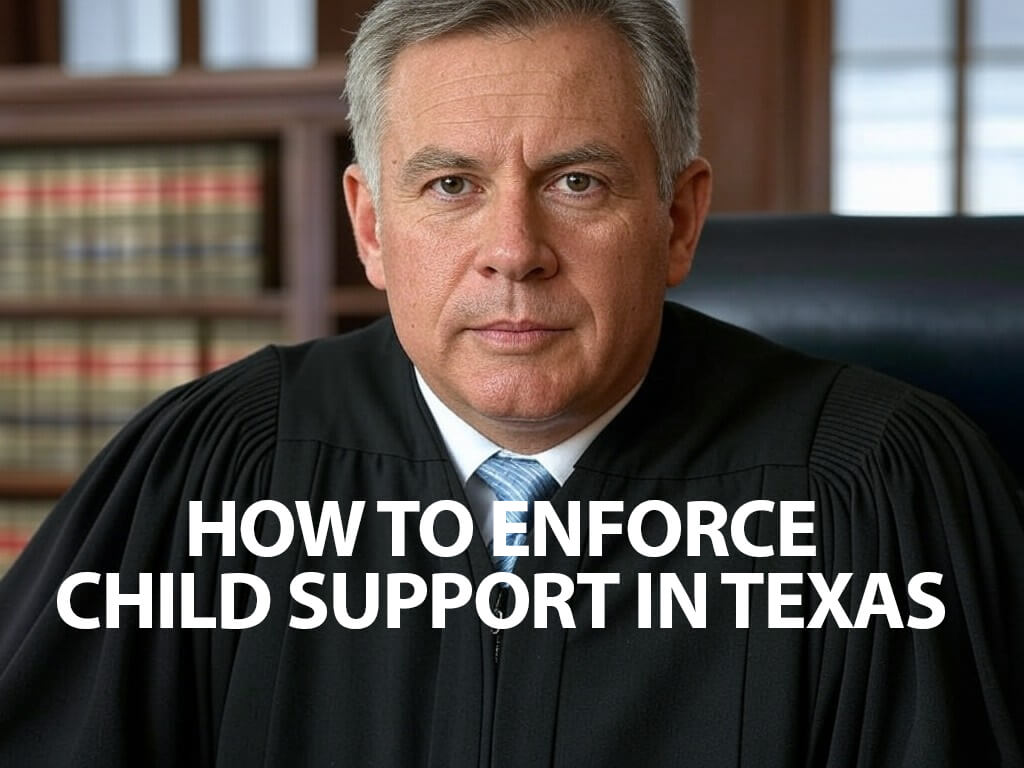In the US, there are more than 13 million divorced parents with children under the age of 21. Typically, one of the parents has physical custody and relies on child support paid by the other parent. Statistics show that when all child support is paid as agreed in the divorce decree, both parents remain involved with their children, and the children usually have an acceptable standard of living. Conversely, when child support is not paid, custodial parents and their children are at risk for financial turmoil. Unfortunately, a disproportionate number of divorced single parents and their children do not receive child support and live below established poverty levels.
Like most other states, Texas uses a formula to determine child support obligations. It considers certain factors to come up with affordable numbers for each parent while ensuring the children’s needs are met. Those factors include:
- Where the child will live
- Each parent’s income
- The child’s needs, including health insurance, education, clothing, and food
As your lawyer, we can help you understand how the formula will apply to your unique financial situation and if there are any opportunities for deductions or additions.
When Can I Modify My Child Support Order?
Family courts in Houston require a substantial change in circumstances to change a child support order. This usually occurs when one parent either receives a large increase or a substantial decrease in income. This can come from a raise, job loss, disability, oil and gas royalties, or a medical emergency.
The child’s needs can also change, requiring a modification of support. This can include the need for increased health care spending or enroll in a new school.
Houston Child Support Basics
Each child’s biological parents are legally obligated to support the child financially. That obligation lasts until the child reaches “the age of majority” (depending on state law, 18 or 21), marries, joins the military, or becomes self-supporting. When parents live together, the level of financial support provided is generally not questioned.
When parents divorce or are unmarried, the parent who does not live with their child is usually obligated to pay child support. Support is owed whether the child lives with their other parent or a third party and whether or not the person with whom the child lives can afford to support the child on their own. Depending on the state, support may be owed even if the parents share custody.
Each state has adopted a set of guidelines for determining child support. Family courts use the guidelines to establish the amount of support. Some states allow courts to adjust the amounts the state guidelines indicate. Most courts, however, tend to closely follow the amounts the guidelines establish unless something in the case indicates the need for a change.
Child Support Lawyers in Houston
Support guidelines generally fall into one of three categories. Each uses a different approach to establish the amount of support, though they all consider the needs of the child. Provisions for medical costs and insurance are generally added to the basic amount suggested by the state guidelines. The three guideline categories are:
- Percentage-Calculates support based upon a flat or varying percentage of the paying parent’s income.
- Income Shares Model– Calculates support based on a formula determining the proportion of parental income the child would have received if the parents had not divorced.
- Melson Formula-Calculates support using a complex formula that considers the economic conditions of the parties involved, their standard of living, and the overall equities of the situation. The goal of the Melson Formula is to give children the standard of living of their more affluent parent, even if the custodial parent gets a financial benefit to which they may otherwise not be entitled.
Putting Information Together
It’s important to ensure the following financial records are prepared before your child support hearing:
- Tax returns
- Medical expenses
- Income statements
- Credit card or loan debt
When Child Support isn’t Paid
A court order mandates child support. If someone fails to pay child support, Mr. Stewart will file a contempt order to initiate legal processes to collect child support owed to your children. By law, wages can be garnished, and violators jailed if they refuse or fail to pay child support, which they are responsible for paying.
As a child custody attorney, Scott David Stewart also hires private investigators and forensic accountants to locate delinquent parents and uncover financial information pertinent to child support disputes.
Prepared to Defend Your Children
Child support is about children. Personal differences between parents should not affect the financial support children are entitled to for their care and maintenance. Child support attorney Scott David Stewart understands what steps must be taken to determine child support, how to use the law to collect it, and how to help families prepare for the future. If a modification of child support is necessary because of changes in circumstances, our offices can work with you to determine appropriate action.
Whatever approach is used, courts look at a variety of sources to determine the paying parents’ income and ability to pay. Income may include wages and the following items:
- Investments, stocks, and pensions;
- Government payments and benefits like disability, social security, and veteran unemployment payments;
- Goods and services that come with a job or are given by family members, friends, or new spouses;
- Gifts and inheritances;
- Income from the rental property and/or
- Overtime, seasonal or part-time second jobs.
People who receive welfare payments or who are unemployed without wages will usually be ordered to make a small monthly payment. A court may assign an income different than the one a paying parent appears to have if they believe they are capable of higher earnings.
Recent Articles on Texas Child Support Issues

How to Enforce Child Support in Texas

Understanding Child Support Calculations in Texas

How To Fill Out A Financial Affidavit for Child Support

Are wages withheld for child support?
What’s A Temporary Hearing? How Temporary Is It?
Putting a “Cap” on Child Support in Texas
How much will I have to pay in Child Support?

How Much Is a Child Support Lawyer?

How Does Child Support Work If Parent is Overseas?

What Questions Will the Judge Ask During a Child Support Hearing?
Houston Child Support Lawyer FAQ
In Houston, child support payments are a court-ordered sum that a non-custodial parent must pay out to the custodial parent to cover a proportionate amount of the child’s expenses, such as housing and utilities, food, clothing, education expenses, and other costs. Both parents must support their children, both before and after a divorce. State laws vary substantially regarding how the courts compute child support payment, and child support orders may be altered only by a different court order. One of our Houston child support attorneys can answer important questions about child support payments, including strict adherence to child support guidelines.
1) How is child support figured out?
Many states have different child support specifications. Every single state has different established minimum levels of child support. Various state courts have established guidelines for awards of child support above the statutory minimums.
A Child Support “guideline” is set up by calculating the minimum amount of Houston child support to be given by a parent. The law directs the judge first to add up the entire net monthly income of both parents.
Then, the judge must compute the percentage of that income made by the non-custodial parent. That amount is multiplied by the applicable degree of welfare payments for the number of children in the household.
The result of this calculation would be the minimum child support. It must be understood that in most cases, the court orders child support higher than the minimum level, as established by local support guidelines.
The majority of child support is paid under the Child Support Guideline. The guideline uses a complicated mathematical formula. Computer programs have to be used to determine child support under this guideline.
2) How many years is Houston child support supposed to be paid?
Child support should be paid until the kid becomes 18 unless your child has not managed to graduate through high school. When the child has not yet graduated high school the child support continues up until the child has finished high school or becomes 19, whatever happens first.
Presently, the law doesn’t provide judges the power to compel a parent to support a child past the age of 19, unless the child is physically or mentally disabled.
Even so, the parents can agree that child support is to continue into the college years, and the Family Law Court will enforce these kinds of agreements.
3) How is child support expected to be paid?
Except when the custodial parent says otherwise, all child support will be paid through a wage assignment. This means that the payments must be deducted from the wages of the parent who is obligated to pay child support.
4) How is child support calculated?
Several states have a statewide formula (known as the guideline) for determining child support. If the parents can’t agree, the judge will decide the child support sum based on the guideline computation.
Things that might be important to your state’s child support calculation include:
- Parents’ incomes
- Parents’ assets (property, investments and so forth)
- Child’s medical bills
- Daycare costs
- Time child spends with the non-custodial parent
- Children’s ages
- Child support or alimony from a prior marriage
- Insurance costs
Child support Houston might also involve the expense of special needs such as:
- Traveling for visitation from one parent the other
- Educational expenses
- Other special needs
5) Can I have child support for the time before the child support order?
If you don’t receive public assistance, you can receive child support from the day you filed your case seeking child support. To get support from this date, you must serve the other parent within three months after presenting your case.
The judge might also give child support starting from the hearing date, the year the other parent was served, or some other time based on the specifics of the case.
Houston Child Support Lawyers
Every parent has a responsibility to provide excellent care for his or her child. Houston Child support is a court-ordered financial payment from one or both parents to cover their child’s living expenses and healthcare costs. Child support payments can be a complex issue, and they are often a cause of conflict during divorce cases.
Whether you are having trouble getting child support payments from the other parent of your kid or you have been ordered to pay an unjust sum, the Houston child support attorneys at our firm can help. Speak to our offices right now to speak with an attorney today.
Child Support Cases Houston We Deal with
We all understand the frustration of deciding reasonable child support payments and collecting those payments from the child’s parent. We can help you with numerous child support problems, such as all those associated with:
Modifications to Support Agreements
Enforcing Support Agreements
Figuring out a reasonable child support agreement can be quite hard. Even after a payment sum has been established, some parents are unwilling to pay what they have been ordered to pay. If you are going through any issues associated with child support payments, you deserve experienced legal assistance. Our Houston child support lawyers will fight to assist you in obtaining the child support agreement you need to have.
According to the definition, Houston Child Support is the duty to make payments for the financial care and support of your child during and after a separation or divorce. Generally, the non-custodial parent pays the custodial parent. A father may be required to pay the mother, or perhaps the mother might be required to pay the father.
Houston Child Support Enforcement
Just about all states run a child support enforcement program. Child support can be taken out of a parent’s paycheck. Any overdue child support may be obtained from:
- Federal and state income tax refunds
- Liens placed on the property
- Selling property
Adjusting Houston Child Support Orders
In many states, child support is usually recalculated regularly. In these states, courts require parents to trade tax return information to determine whether child support needs to be raised. In most states, either parent may file a court motion to recalculate child support at any time.
In case you pay support, you need to request the court to recalculate it if:
- Your income goes down considerably or you lose your job
- The other parent’s income grows
- Living expenses change in either household
If you are the parent receiving child support, you may want to ask for recalculation when:
- The paying parent’s income increases, or you learn not every income was revealed
- It has been years since the previous recalculation, and your child’s expenses have increased
When Do Child Support Payments Stop?
Child support obligations usually stop when a child attains the age of majority, which varies by state. However, a court can order child support for a more extended period, such as until the child graduates from college.
Questions to Ask Your Lawyer
- If I lose my job, may I stop making child support payments?
- Are child support payments required if custody is shared?
- How many times can child support payments be modified?
Conclusion
An experienced family law attorney can assist a parent in obtaining an order for the appropriate amount of child support and enforce the order. Family law lawyers can also represent either parent in a support modification proceeding or in proceedings to establish or disprove paternity. Because the well-being of children is at stake, child support issues are of paramount concern, and the assistance of an experienced lawyer is essential to the process.

